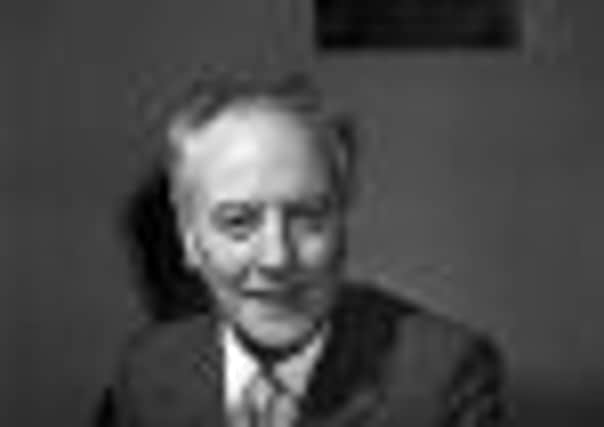Obituary: Philip Mackie, Scots newsman who won plaudits as royal press officer during Diana and Charles’s split


Philip Mackie rose to senior ranks in Scottish journalism when newspapers were vibrant, profits buoyant, circulation wars roared across Scotland’s Central Belt and no holds were barred to secure the story.
After more than 30 years in frontline journalism, and holding the position of associate editor of the Edinburgh Evening News, Mackie decided to retire to the peace of the Highlands around Beauly.
Advertisement
Hide AdAdvertisement
Hide AdIt was then that he received a momentous telephone call from Buckingham Palace and his career took off again in an entirely new direction as assistant press secretary to the Queen, and then in a similar role to Prince Charles and Princess Diana.
All Mackie’s tough newspaper experience was called upon as he suddenly found himself at the sharp end of handling a demanding world media, insatiable for news during that fraught period when the royal couple’s marriage was collapsing.
Phil Mackie (Phil even to the copyboys) was born in 1932, the son of a policeman, and attended Zetland Primary School in Grangemouth. After national service, he entered journalism as a reporter with the weekly Falkirk Mail, but soon the excitement of the big time was calling and he joined the Daily Record in Glasgow, where he became its crime reporter.
This was a role that suited Mackie’s talents admirably as it called for fast thinking, guile and ingenuity while reporting at speed, as well as integrity to his paper and his contacts. It was at this time Mackie established many contacts among the police, some at high level, who became friends for life.
At a time when press-police relationships are under close scrutiny, it is noteworthy that in Mackie’s day it was seen that both sides needed each other – a good working relationship helping solve crime and fill newspaper columns – without living in each other’s pockets.
In the 1960s, Mackie’s reputation for producing major scoops, beating the opposition to the story and excavating facts others missed, took him to the Daily Express, then one of the most powerful papers in Scotland. It was a volatile time of ferocious competition. Major crimes were Mackie’s beat, and he personally knew many of Scotland’s most notorious criminals, including the serial killer Peter Manuel.
On one occasion Mackie spirited off an early suspect in the Manuel murders to a safehouse to ensure his paper’s exclusivity. When the interview was completed, he was returning the suspect home by car when the driver crashed and the occupants were seriously injured. As police and ambulance staff arrived, Mackie was asked if there was anyone they should call. “Tell my newsdesk,” he said.
With his sharp news sense and energy, Mackie was promoted to the Daily Express newsdesk, where he handled some of the biggest Scottish stories of the day and where it was discovered he also had an unexpected talent for publicity and promotions.
Advertisement
Hide AdAdvertisement
Hide AdHis ability to get along with people, his quick wit, organising skills and the fact he was one of the snappiest dressers in the business, saw him increasingly used to represent the paper in public and he become a rising star in this specialist field.
He was wooed by The Scotsman Publications to become its publicity manager and during Mackie’s time at the old North Bridge office, he masterminded the Evening News’s Charity Walk, which became one of the biggest fund raisers of its kind in Scotland, providing thousands of pounds for local good causes and needy groups.
Included in his charity work were film premieres with big-name stars, and sometime even royalty making personal appearances.
His reputation as a hard-news man returned him to journalism and he become deputy editor of the Edinburgh Evening News. Even then he continued to develop his role in charity work and became friends with many stars of stage, screen and entertainment.
Among the celebrities he brought to Edinburgh were Princess Margaret, Frankie Vaughan, Michael Crawford, Jan Leeming, Angela Rippon and Sir Jimmy Savile, who led the Charity Walk for some years.
Although appointed associate editor of the Evening News, Mackie decided it was time to leave the hurly-burly of a big evening paper and take things easier. His retirement lasted less than a year before he was pitched headlong into the goldfish bowl of royal media relations with his office inside Buckingham Palace.
It was a difficult and delicate role demanding the highest standards of integrity. Even to close friends, Mackie never commented on his life with the royals. In his view what happened to the Royal Family in the background was private and personal and no secrets escaped the Palace during his watch. After the royal divorce, he became Prince Charles’s personal press secretary.
He helped to organise a number of royal tours and, notably, Charles’s visit to Australia was seen as a major media success. Mackie’s picture idea of the Prince wearing an Australian bush hat, complete with bouncing corks, resulted in coverage around the world.
Advertisement
Hide AdAdvertisement
Hide AdBefore his retirement he was awarded the honour of Lieutenant of the Victorian Order by the Queen for his royal services.
In 1957, Mackie married the love of his life, Margaret Grant, in Falkirk.
He leaves behind his beloved Margaret and daughters Helena and Mairi. For the past eight years they had lived quietly in Linlithgow, but Mackie still kept in touch with media affairs.
Phil Mackie was one of that small, diminishing band who lived their journalism to the hilt when it was at its most exciting. Sadly, today’s young news hounds are unlikely to experience the likes of that era again.
IAN NIMMO